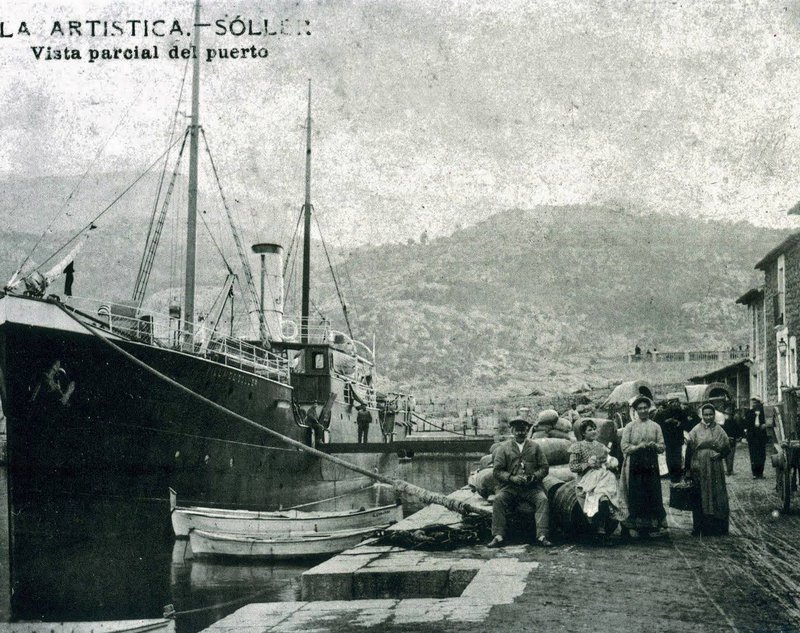Back on terra firma
After a rough passage from Barcelona, a 19th century lady enjoys the simple delights Mallorca has to offer
Women Travellers in Catalan Lands
Dec 30. A most agreeable present arrived at breakfast-time from the consul, an enormous sweet brioche, about two feet in diameter, and in shape like a gigantic cornu ammonis, and as good to eat as to look at, reposing on a heap of sweet rusks; à propos of which I may remark, that in all the Spanish towns we have uniformly met with excellent bread, and here it was particularly good.
In the course of the morning M. Constant accompanied us to the cathedral, which was built towards the close of the 13th century; and if finished, would be extremely handsome within, as well as without; but it is so far from completion, that most of the long lance-shaped windows are filled up, and only small square openings left at the top for light. Those which are filled with stained glass are the richest in colour I ever saw, consisting entirely of the deepest and most gorgeous reds, dark blues, greens, and browns, like a cluster of carbuncles. (...)
Above the high altar were suspended in the air by threads an infinity of little white things, like paper butterflies, which, it seems, are sacred wafers; and it is the custom so to suspend them from Christmas till the Epiphany. Several canons were chanting in the choir; and after mass was over, we were accosted by one of them, a friend of the consul, who spoke very good English; he was a native of Minorca, and they frequently learn English, at least with the American accent, at Port Mahon, the usual winter station for American ships in the Mediterranean.(...)
Dec 31. This was the anniversary of the taking of the town from the Moors, and high mass was performed at the cathedral in consequence. We walked up an ascent to a new fish-market, which seemed well supplied; and here were some most extraordinarily dressed peasants. One very fine-looking old man in particular was admirable in his costume, which was a large spotted calf-skin put on as a pelisse, entire, with two apertures for the arms, and the tail cut off: the straightness and length of the back, and the perfect gravity with which the wearer was talking and gesticulating with a friend hardly less extraordinarily accoutred, was irresistible.
We afterwards took a long walk out of the town, through the green corn-fields, full of fig-trees, olives, and almond-trees, which in a month will be in full flower. We passed by some deserted convents, with very fine palm-trees in their gardens; came to a large cemetery, with numbers of monuments in stone and marble, and some in coloured tiles; crossed a small river, and walked to an eminence looking down on a beautiful valley beyond, wooded with olives and ilexes, with views of the fine outlines of the mountains, which are peaked and craggy : returned by the same way to the town, meeting numbers of peasants in full costume, with black hats with enormous rims, a kind of dark waistcoat, and very full white trowsers, like the Greek dress, all but the hat — their hair growing in a bush, like that of the Russian priests. These men sit at an immense height on their mules, on a kind of platform saddle, so that their legs are sometimes placed horizontally at full length, and always sideways; they have fine good-natured countenances, and evince no surprise at the sight of strangers, in which they differ much from the Spaniards, to whom we must be much less a novelty.
The steamer, the “Mallorquin,” came in from Barcelona this morning: the storm had been dreadful there; 16 vessels were lost in the harbour, and some driven out, and wrecked on the bar. An English brig was lost on the coast near Rosas; the captain, two ladies, and four of the crew, were drowned. “La Surprise” saved two vessels which were driving out, by catching hold of them with grappling irons. A Dutch galliot and a Swedish brig ran ashore near Monjuich, and the crews were drowned, all but seven men out of the two vessels. The crew of a Russian ship in the harbour saved themselves by leaving the ship, which went to pieces.
Elizabeth Mary Grosvenor
In 1819, Lady Elizabeth Mary Grosvenor (1797-1891) married Richard Grosvenor, 2nd Marquis of Westminster. Together they had 13 children and spent long periods abroad. In 1827, they travelled to Scandinavia and Russia, which she recorded in a journal published decades later as Diary of a Tour in Sweden, Norway, and Russia, in 1827, with Letters (1879). Likewise, in 1835–36 they toured Germany and Italy, and, between 1840 and 1841, along the Mediterranean aboard their schooner “Dolphin”. These latter impressions became a Narrative of a Yacht Voyage in the Mediterranean, During the Years 1840-41 (1842), a captivating book featuring excellent accounts of perilous tempests. The Quarterly Review described it as a “sensible, healthy, and well-written work, utterly free from all affectations”. Lady Grosvenor and her family had a rough crossing from Barcelona to Mallorca, weathering gales for three days. This explains, as the excerpt reveals, the elated tone with which she describes the Balearic capital. From the ensaïmada pastries to the gothic monumentality of the cathedral or the picturesque garments of the peasants, everything is a feast to the eyes of someone who once again enjoys the comforts of solid ground. Yet, the haven Mallorca affords is in stark contrast to the plight of less fortunate vessels. A reminder, even to yachting aristocrats, that a Mediterranean voyage was no easy adventure.




